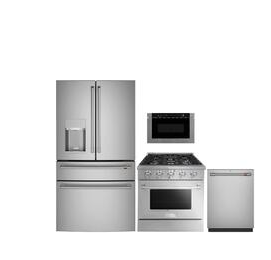The ideal stove according to your way of cooking

Stoves have had two basic choices for decades: gas or electric. Serious chefs prefer gas stoves because they heat up rapidly and provide more exact temperature control. But, not long ago, a third alternative for your kitchen became available: induction cooktops. Although each variety has distinct benefits, most chefs choose their range depending on their preferred cooking style.
Electric ranges are less costly and are seen in almost every kitchen. When not in use, ceramic cooktops are smooth and appear tidy. Because they have a smooth, flat surface, they are also very simple to clean.
Electric Stoves

They're wonderful, and you can't go wrong with them for regular dinners. Although controlling the precise temperature on an electric stove is more challenging, most chefs get familiar with their stove and know how long it takes to heat a pan or boil water. A ceramic cooktop won't provide fast heat, but it will provide excellent cooking results. You may fry, sauté, boil, brown, and simmer on an electric stove, such as a gas burner. The burner will take several minutes to cool down if you need to drop temperatures fast. Similarly, if you want to sear a piece of meat rapidly, you'll have to wait until the burner reaches the appropriate heat level or temperature. For a more professional cook or chef, this may not be acceptable.
Baking is one area where the electric range shines. Electric ovens heat up more evenly and steadily than gas ovens. They also generate dryer air, which is ideal for grilling and barbecuing. Electric ovens with real European convection, feature highly accurate temperature settings and circulate hot air to ensure that food bakes evenly and consistently for near-perfect results.
If you cook with gas:

For a long time, gas cooktops have been praised for their quick heat-up and precise temperature control. On a gas stove, you can swiftly boil, cook, and flambe. Although food may "bake" on the grates or beneath the burners, most feature solid metal burner grates that maintain pans uniformly above the heat and are relatively simple to clean.
A gas burner may be the best option for you if you are an ambitious chef who likes experimenting with different cooking methods. However, you must ensure that your kitchen has a gas connection in order to connect your gas stove. A gas line for a range is not always present in today's kitchens, and having one installed might be costly. If you don't already have gas lines in your kitchen, you'll need to contact a qualified plumber for an estimate.
Although gas ovens are infamous for heating unevenly and the air being too humid for certain dishes, gas-fueled stoves are still a viable alternative. A common option is a dual-fuel cooktop, which combines a gas range with an electric convection oven to ensure that all of the meals you cook and bake are done to perfection. Perfect in every way.










